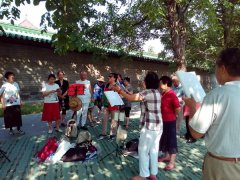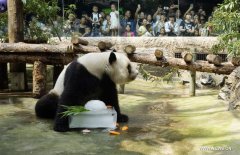Feature: Biography project aims to revive Beijingers' hutong memory
By Shen Xiaobo & Wang Jiaquan
BEIJING, Oct. 13 (Xinhua) -- Beijingers boast that under each brick of the ancient capital's hutongs hides a story. They are not exaggerating.
In an ordinary house in a cramped hutong, or narrow alley, to the south of Tian'anmen Square, Wang Jinghu is penning a story about his great-grandfather Wang Fengqing, an eminent Peking Opera master.
Wang Jinghu, 62, a retired mechanical engineer, has no real connection to the performing art, but pride pervades his words when he talks about the achievements of his ancestors, such as an Imperial Yellow Jacket gifted to his great-grandfather by Empress Dowager Cixi of the Qing Dynasty (1644-1911).
The Imperial Yellow Jacket, or "huangmagua," was the highest honor a Qing emperor or empress could extend to officials or ordinary people.
Today, few people might know of what happened in the courtyard about a century ago, but Wang says the stories not only belong to his family but also to history of Peking Opera, which is considered as the quintessence of Chinese culture.
Wang's great-grandfather Wang Fengqing made his name as "laosheng," the role of an old man. His unique sonorous tenor won him fame. He was often invited to perform in the Forbidden City for the royal family with his elder brother Wang Yaoqing, who played the "huadan," or young female role.
These two masters taught their pupils in the very courtyard where Wang now lives, including Mei Lanfang (1894-1961), one of the most famous Peking Opera artists in modern Chinese theater.
Wang Jinghu is writing for a biography project which collects stories related to Shitou Community, part of Dashilar, one of the last few historical streets with a complete layout of hutongs, just south of the Forbidden City.
So far, two collections of "Stories of Hutong" have been printed, 500 runs of each. Wang's writing is for the third episode.
BIOGRAPHY FOR THE ORDINARY















